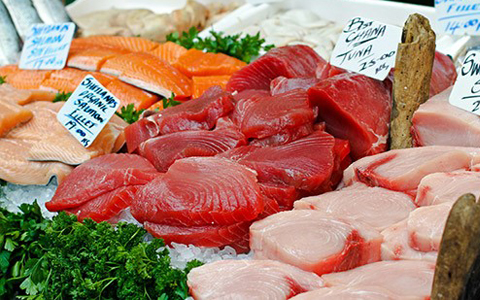Smart labels make food safety stick
Background
Project: IQ-FRESHLABEL
Have you ever stared at packaged meat from your fridge or freezer and wondered if it’s still good to eat? Thrown out food because you just weren’t sure? Smart labels could help to set your mind at rest. An EU-funded project has developed innovative stickers to do just that.

The idea of intelligent labels has been around for several decades, but it has not yet been put into practice on a large scale, says project coordinator Marie Shrestha of the technology transfer centre of the University of Applied Sciences Bremerhaven (ttz Bremerhaven) in Germany.
IQ-Freshlabel set out to upgrade smart label technology for new applications and to find out why it is not yet widely applied. It builds on the outcomes of its predecessor project, Freshlabel, which developed an initial smart label for fresh chilled foods and showed how its use could help to reduce spoilage and associated losses throughout the food supply chain.
The partners involved in IQ-Freshlabel, which ended in January 2014, adapted this label for use on both chilled and frozen packages. They also developed a label for products wrapped under modified atmosphere — i.e. packages where the air has been replaced by a different blend of gases to prolong the shelf life of the food. This technique is commonly used for perishables such as poultry, fish and cheese.
A cool concept
“The labels we have focused on mostly involve so-called time-temperature indicators (TTIs), which can be based on different technologies. We were working from the principle that the main factors influencing the quality and safety of a packaged product are the time and the temperature,” says Shrestha.
Generally speaking, the lower the temperature, the slower the spoilage, she explains. IQ-Freshlabel’s TTIs change colour as a function of temperature and time since packaging. If the product has been compromised by breaches in the cold chain, or if it has been stocked for longer than the storage temperature would permit, the label will mark the package as low quality and potentially unsafe.
This also means that consumers can be confident about products that are labelled as being in good condition, both in shops and in their homes — an improvement that, according to the researchers, could help to reduce food waste.
Neatly packaged solutions
IQ-Freshlabel has developed three types of TTI. One draws on an enzymatic reaction, while the second uses light-sensitive pigments. The third is based on the reaction between an aluminium layer and an adhesive that dissolves this metal layer.
On the enzymatic TTI, a circle gradually changes from green to orange and finally red. On the label imprinted with photosensitive ink, the inside of a thermometer symbol pales from a dark to a light blue. The silver-grey circle on the aluminium-based sticker eventually disappears, revealing the bright yellow of the background.
In addition, the project has produced a label that detects ambient air, more specifically oxygen, leaking into packages that are meant to seal food into a modified atmosphere. If the wrapping is compromised, the contents are likely to spoil faster. IQ-Freshlabel’s smart tag is covered in a substance that reacts to oxygen in the package. Colourless at the beginning of the process, the label gradually turns fluorescent.
“This label does not measure the quality of the product as such. It measures the oxygen composition inside the packaging and correlates it with the quality of the product,” Shrestha explains.
Smart labelling is a compelling concept, and Shrestha reports that the labels could be produced inexpensively. However, she adds, the food supply chain is very fragmented, which complicates the introduction of a labelling approach that has implications for all involved.
The project partners, which include participants from the food industry in several countries, are interacting with various sector associations around Europe to address these issues, Shrestha notes. IQ-Freshlabel’s fresh labels could therefore soon make their way into our homes.
Smart labels support food safety
This innovation was made possible by Israel’s continued participation in the official Horizon 2020 fund, managed in Israel by ISERD part of The Israel Innovation Authority (Formerly the Office of the Chief Scientist and MATIMOP). The initiative has taken Israeli R&D to the next level with the help of ground-breaking collaboration between scientists in Israel and Europe, as well as essential funding and support.
Project details
Project acronym: IQ-FRESHLABEL
Participants: Germany (Coordinator), Finland, Greece, Romania, Poland, Norway, France, Israel, Sweden
Project Reference N° 243423
Total cost: €2 481 595,69
EU contribution: €1 857 470
Duration: August 2010 – January 2014
